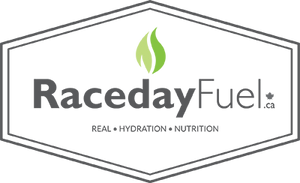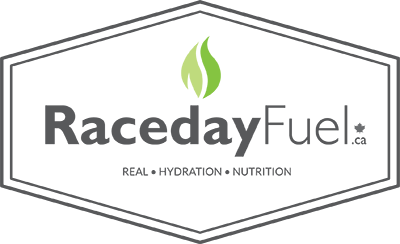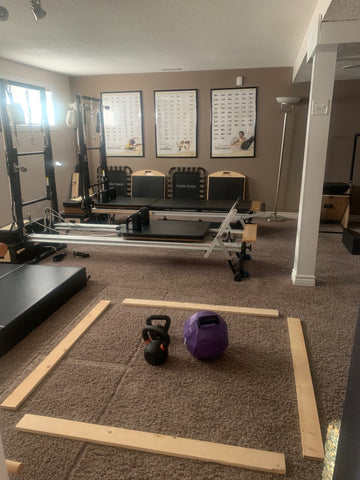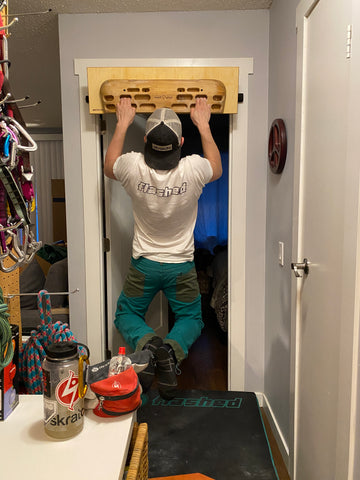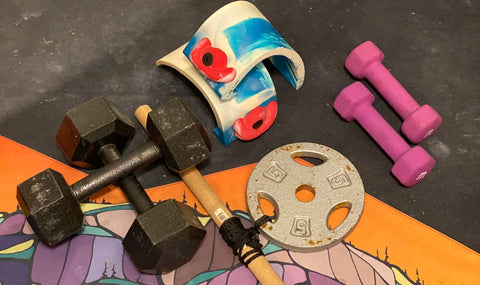COVID-19 - The 2020 global pandemic that changed everything… for almost everyone.
One way or another, we’ve all been affected by COVID-19. Whether you’re an athlete or artist, doctor or politician, IT expert or astronaut - everyone in between, beside, and around. One way or another, we have all felt the effects, each our own way.
Here at Raceday Fuel we have a wonderfully diverse team of athletes from across Canada. We have cyclists, triathletes, and pentathletes. We have rock climbers, power lifters, and paddle boarders. Skiers, skaters, and more… Oh my!
Throughout COVID-19 we have been checking in with different athletes, from our team, our customers, and friends, to hear their thoughts and get insight to how the mental journey of the pandemic has changed for each of them. Be it a change in diet, new at-home training routines, or an increased focus on family time, everyone has had a story to tell.
Here, in part one of this two-part blog series, we share a few of those thoughts from early on.
Julie Toole - Raceday Fuel Ambassador, Cyclist:
On frontline workers, habits and goals.
“I would like to offer an alternative perspective for those of us who work in health care, or any other essential services - and who are working now more than ever - knowing that things are only going to get much much worse in terms of work demands in the next weeks and months. The increased demands on the health care system, combined with the reduced workforce from colleagues self-isolation after travel, exposure, colleagues being sick, or caring for sick family members has really increased the workload for everyone.
Some of us are putting our “training” on hold pretty much entirely (this is a little easier to swallow as most events we were training for have been cancelled or postponed) to focus on work and the bigger picture.
However, the importance of staying healthy has never been more obvious. The training background comes in handy as many of the habits are the same but the goals are different, not training for events or particular metrics (watts/kg at threshold, 5km time, etc.) but rather using all the knowledge from years of training to stay healthy (on all plains) as much as possible. Here are the things I am trying to do:
-
sleep, trying to make sure to get a decent quantity and quality
-
eating fresh whole foods as much as possible
-
getting some zone endurance pace (zone 2) movement in, using the time to clear my mind, not looking at the Garmin too much, not trying to time intervals, just appreciating movement, avoiding getting into a depleted state (an emergency stash of picky bars helps :))
-
mobility work and physio, particularly important as many physio and massage offices are closed and access to health care will be limited for some time, now is not the time to let niggles become injuries.
-
10 minute meditation to feel more grounded in these uncertain times
-
washing hands lots and social isolation!“
Shari Mosthaf - Raceday Fuel Ambassador, Triathlete:
On adapting to train harder.
“This has been quite the week. What started out as a promising week and great gains being made, suddenly turned into closed swimming pools, a state of emergency, and now working from home. I sadly have a couple of friends who have Covid 19, but are recovering at home thankfully.
In the revelation of social distancing, training has become more challenging. Especially with no swimming pool.
With that, and the assistance of my tri coach for bike and run, and my Pilates background as a Stott Pilates instructor, I have put together a training strategy that will have me stronger once this virus runs its course.
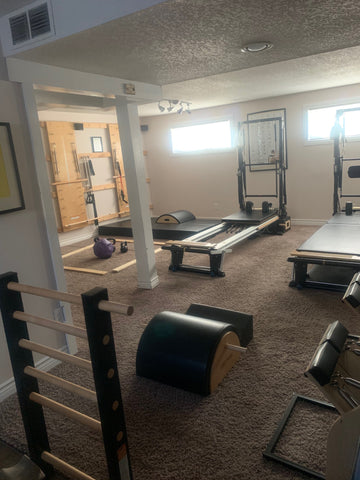
Each morning is either a bike or a run. Each afternoon, it’s either a strength set or a Pilates set. I’m also adding some dry land swim work with my tube.
It’s easy to get stuck on the couch and not get off in the advent of social distancing. I have my studio set up to make sure I get my butt downstairs. I have found that 20-30 minutes is perfect.”
Philip Quade - Raceday Fuel Ambassador, Rock Climber & Adventure Photographer:
On adapting to curve-balls and new training tactics.
“Coincidentally, far before the chatter of COVID, my girlfriend and I set out a timeline for me to finish school, for both of us to move to full-time remote work, and move to BC. All this to be prefaced with an Eastern Canada road trip. It just happened to line up almost perfectly with COVID. It became a “play by ear” juggling act of reassessing and changing plans, one day to the next, until we landed ourselves in Ontario, back where I grew up. Just in time for maple syrup season!
I think the biggest changes for us were the social shock from the closure of our local climbing gyms and pubs, plus increased challenges with moving, and [now] cancelling our business launch tour. It set our departure from Calgary up to be pretty quiet - and ahead of schedule.
The biggest change in training was the lack of climbing facilities, and being spring, it was too wet, and also morally inappropriate to attempt climbing outdoors. Thankfully I discovered a great low profile modular hangboard system that is adaptable to different door frames. That allowed us a lot of opportunity to diversify our training, at least for upper body conditioning. Combined with a make-shift system I built from a chin-up bar and a wooden hangboard, we had a lot of systems covered. I train on the road a lot, as I travel and live in my truck on shoots and climbing trips. Over the years I’ve collected a good array of home and mobile training gear.
In Ontario I have my homewall, which has been in production for a few years, and grows a little each time I return. It has been a saving-grace.”
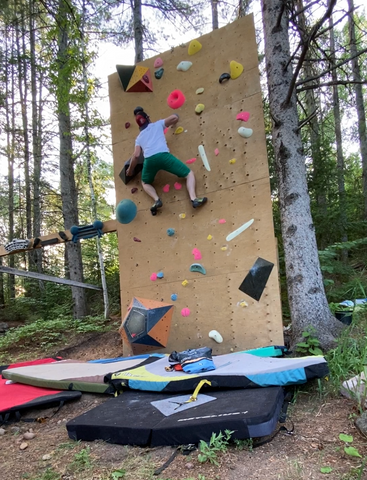
What kind of changes or struggles have you faced throughout COVID-19?
What have you done and are you doing to overcome obstacles, and adapt to change?
Share your stories with us, online, and help spread the ideas and keep the positive mindsets going. Tag us in your home training on Facebook and Instagram. We’re all in this together.
